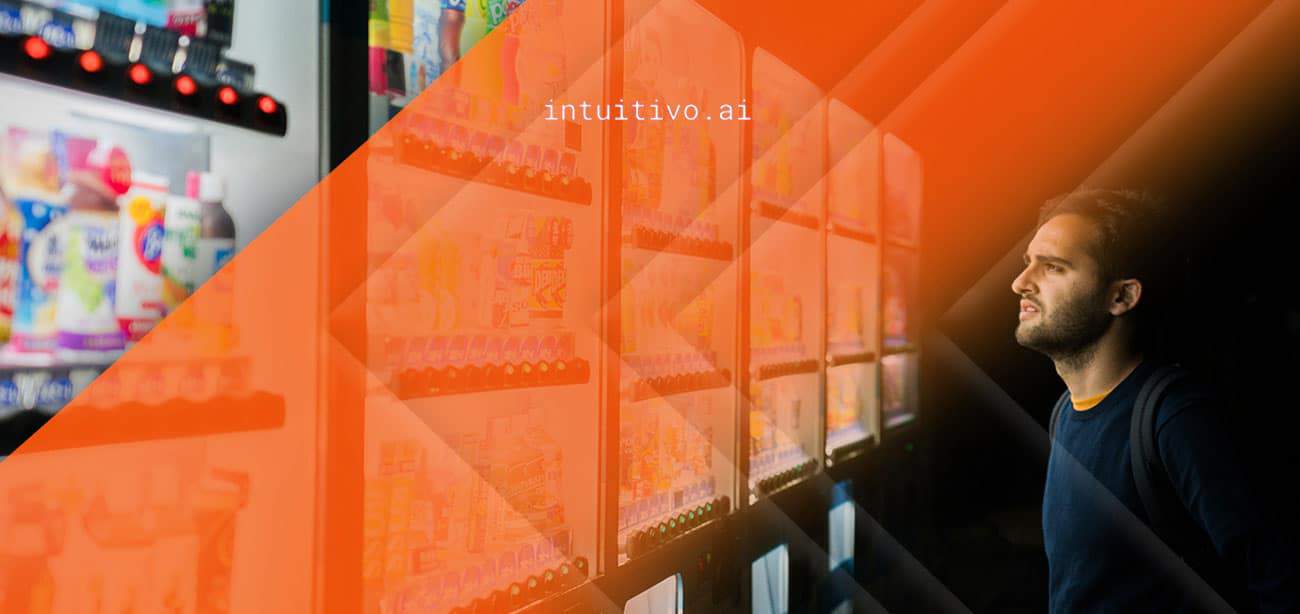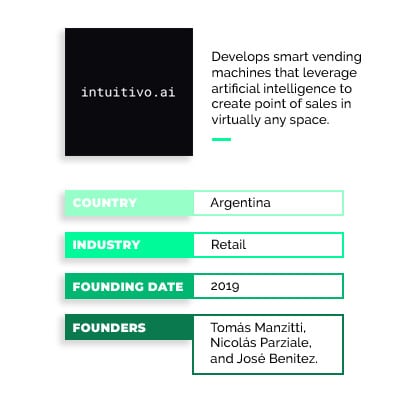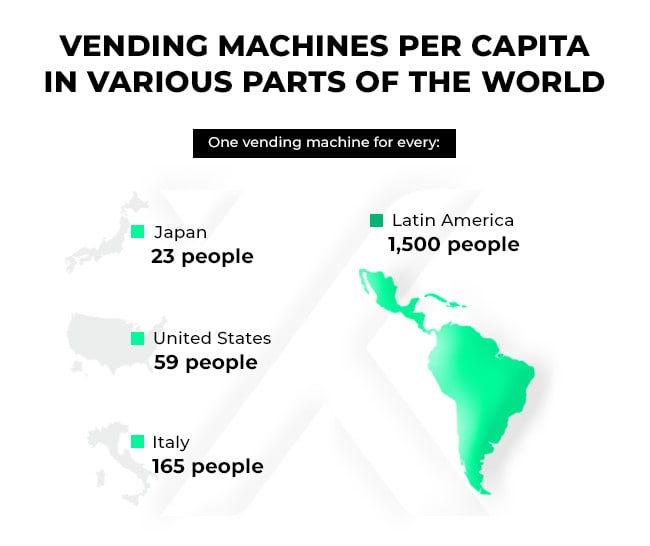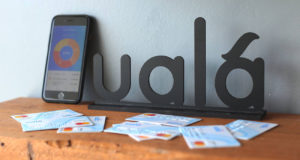
Por Mariana López
December 15, 2019
Contxto – If you live in Latin America, chances are you’ve rarely used a vending machine—if ever.
Meanwhile in Japan, one can find wacky vending machines dispensing things like neckties, flower, even puppies. For its part, in the United States there’s a fully-automated car vending machine.
Despite their practicality, they just aren’t seen or used so intensely in Latin America.
However, this may soon change as Intuitivo, a startup based in Argentina is building the vending machine of the future with Latin America in mind.

Vending machines never really stuck in Latin America the way they did in other places. This reality is illustrated by the ratio of vending machines per capita in various places.
For example, in Japan, there’s one vending machine for every 23 people. This makes it the vending machine king. Meanwhile, in the United States, there’s one vending machine for every 59 people. Even Europe has its share of vending machines, with one for every 165 people in Italy.
Latin America pales in comparison to these numbers with one vending machine for every 1,500 people.

This reality can be explained for two reasons.
First, the cost of the machine itself isn’t accessible for most. Installing a machine in this part of the world costs around US$7,000 to US$15,000.
Second, are payment-related complications. Examples include the machine annoyingly rejecting a user’s bill, lack of change, etc.
To tend to this costly reality, Intuitivo develops hardware and software that can basically transform any fridge or container into an autonomous point of sale.
Such a feat is achieved via computer vision and a QR code.
Let’s break this down.
Computer vision is artificial intelligence (AI) technology that enables a computer to “see” images, identify them, and label them accordingly.
In Intuitivo’s case, computer vision is harnessed onto the inside of a fridge or container. The software then learns to identify the products stored within.
Meanwhile, outside the fridge, there’s a QR code, which is integrated with payment processors like Mercado Pago or Rappi to complete transactions.
So what happens is a user approaches the smart vending machine and scans the QR code to access the smart cabin. The electromagnetic doors on the vending machine open and the person may grab whatever items suit their fancy. Intuitivo’s system “sees” and knows what items are taken.
The person then covers the cost of the goods via electronic payment.
This ultimately results in an enhanced experience for the consumer through a seamless payment process.
The ultimate goal is to create accessible hardware including a computer, sensor, and camera to lower the cost of having and operating a vending machine.
Some startups are conceived as vague ideas that take a while to fully emerge and consolidate into a business. This wasn’t Intuitivo’s case. As its three founders had decided to make the leap and founded it within a matter of months during the second half of 2019.
Intuitivo’s leadership has a natural inclination for entrepreneurship and tech. Both Tomás Manzitti and Nicolas Parziale had founded and developed food-delivery startups. Manzitti created food-delivery solution Sinimanes before it was sold to German Delivery Hero back in 2014.
Meanwhile, Parziale founded cooking and food-delivery solution HoyPido with urban office workers in mind in 2015. Both he and José Benitez have ample experience in software development which they naturally brought into Intuitivo’s smart vending machines.
When it came to creating their solution, they didn’t jump the gun in developing their product first and asking questions later. Rather, they first screened potential customers within their targeted market. The purpose of this was naturally to find their product fit.
After some enlightening feedback, they chose to focus on developing their solution.
Within this time, they’ve faced “technological challenges,” in developing their product. These have thankfully been overcome, according to its founders, thanks to the talent of their team.
This has resulted in what Intuitivo considers to be one of their most important achievements: transforming tech that is normally complex and hard to reach and use, accessible for your Average Joe.
In that sense, one of their most important contributions is cutting down obstacles for more tech inclusion. In this case, via vending machines and electronic payments.
Consumers won’t find Intuitivo‘s tech on vending machines just yet. But deployment plans are underway. To appreciate how it may become a reality, there are a few factors to keep in mind.
To begin with, Intuitivo is well aware that cold drinks constitute 30 percent of vending machine sales worldwide. This means that alliances with certain food and drink companies would be a key part of its business model.
Now, as anyone who travels throughout Latin America may observe, there are branded fridges in food stands, bars, etc. Intuitivo would partner up with these big-name companies like Coca-Cola to install their technology in their fridges.
In that sense, it’d be a win-win. These soft drink providers profit from the sale of their products, which obviously are more attractive because they’re cool.
For its part, the startup would generate revenue from two sources of income. The cost of the hardware itself, which would sell for around US$250. Once acquired, Intuitivo would also charge a small rate over the transaction.
These smart vending machines would be placed in semi-public spaces such as universities, offices, and shopping malls. Moreover, Intuitivo’s smart tech can also be placed in traditional retailers to speed up the shopping process.
There are an estimated 400,000 vending machines throughout Latin America. Albeit there should be 4 million, given the population of the region, according to Intuitivo. Through the application of its solution on fridges and containers, this startup aims to give rise to 3.5 million vending machines.
For Intuitivo, putting together the best team is a top priority. Consequently, it has focused on finding developers to join them. Likewise, its founders are also on the lookout for solid investors that understand what their products can achieve.
Electronic payments are steadily gaining ground in Latin America. Likewise, technology has made consumers and companies more savvy for quick, low-cost solutions. These factors come to life in Intuitivo’s business-to-business (B2B) proposal.
-ML

Por Yanin Alfaro
March 25, 2025

Por Contxto
May 27, 2024